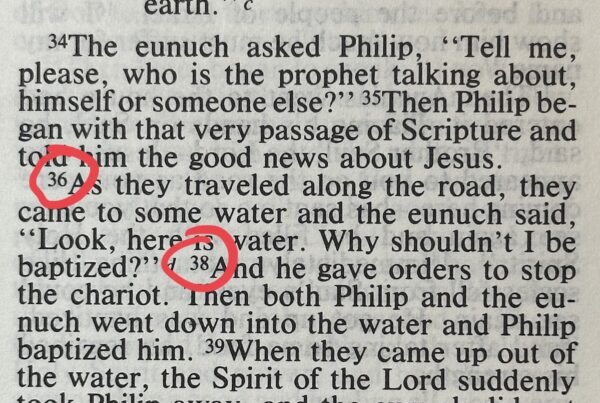Carla submitted this very difficult question:
“I struggle mightfully, painfully, fearfully with the concept of God’s Elect/Chosen. Does God choose some to be his own but not others? If so, how does that work with the verses that suggest man has a choice/can seek out God and expect His grace/mercy/acceptance? How terrifying to think some individuals are pre-destined for Hell/damnation.”
Here are some considerations in reply:
Carla’s questions are difficult and raise various issues upon which Christians disagree. One important perspective is offered by Calvinist Christians–primarily because their ideas are classically presented by the Protestant Reformer, John Calvin. First, I will summarize briefly what Calvinist Christians believe on the matter of “election” and “predestination.” While I think that some aspects of this view are correct, I will then explain why I think other aspects of the Calvinist position are incorrect and should be modified in light of Scripture. In doing so, I will present what I believe is a more biblical perspective on the issue of predestination and election.
Calvinist Christians believe that God alone makes it possible for a person to place faith in Christ and be saved. Calvinism holds that a person cannot and will not place faith in Christ and receive salvation unless God specifically elects/chooses that person and gives him or her the gift of faith. God’s choosing of certain people and not others is, according to Calvinism, part of His mysterious will; that is, God does not choose people based on anything the elect did. Nobody can merit or earn being chosen by God. The elect also cannot resist placing faith in Christ and cannot ever turn away from their faith once they accept Jesus. Those people whom God elects have been predestined for salvation from all eternity. Calvinism holds that anyone who is not among God’s elect cannot choose to place faith in Christ and be saved, and Jesus did not die for them. They were predestined to be separated from God for all eternity and have no ability to choose to be saved.
Let us now consider some of the merits and flaws of Calvinism. As Carla mentioned, there are verses that seem to indicate predestination. For example, in Ephesians 1:4-5 Paul says God “chose us in him before the creation of the world to be holy and blameless in his sight. In love he predestined us for adoption to sonship through Jesus Christ, in accordance with his pleasure and will.” A few verses later, in verse 11, Paul says, “In [Jesus] we were also chosen, having been predestined according to the plan of him who works out everything in conformity with the purpose of his will.” Similarly, Paul writes in Romans 8:29-30 that “those God foreknew he also predestined to be conformed to the image of his Son, that he might be the firstborn among many brothers and sisters. And those he predestined, he also called; those he called, he also justified; those he justified, he also glorified.”
But Carla also notices that there are verses indicating that we must choose to accept God and that this salvation is available to all people. For example, Jesus famously says in John 3:16 that God’s love extends to the whole world, and “whosoever believes” in Jesus will have eternal life. Paul likewise says “the grace of God has appeared that offers salvation to all people” (Titus 2:11). And again, God “is the Savior of all men, especially of believers” (1 Timothy 4:10). So while Jesus is the savior for all people in the sense that anyone can accept the salvation He offers, it is only believers who will ultimately be saved. As further evidence that God offers salvation to all people, consider the fact that God wants all people to be saved (1 Timothy 2:4; 2 Peter 3:9). In what sense could God, who sent his Son “to seek and to save that which was lost” (Luke 19:10), genuinely desire the salvation of every person if some people are not even given the opportunity to accept that salvation? God’s offer of salvation goes out to all people, Jesus died for all people, and God loves the whole world and desires the salvation of all people; nevertheless, only some will choose to respond to God’s saving grace and be saved.
So Calvinism seems to recognize correctly that there is a sense in which those who will be saved have been predestined by God from all of eternity, but Calvinism seems incorrect in denying that salvation is freely available to all people and that all have the opportunity to accept this salvation through what Jesus did for us on the cross. How then should one best make sense of both of these biblical truths?
I believe that those who will be saved are “predestined” by God in the sense that God foreknows from eternity who will be saved. More than that, from all of eternity God has determined to place each person He will create into a unique circumstance in history (e.g., time, place, upbringing, etc.). For each person that God could create, God eternally knows in which circumstances that person would freely choose to accept His grace and be saved and in which circumstances that person would freely choose to reject His grace and be lost. So by creating the world a certain way and placing Person X into certain life circumstances, God knows in advance whether X will choose to be saved in those circumstances.
I myself happen to have freely chosen to accept God’s grace in the life circumstances in which God has placed me, and God eternally knew that I would. But I have no doubt that God could have ordered the world differently and placed me into different circumstances such that I would not choose to accept God’s grace and be saved. Had He done so, God would have eternally known that I would not be saved.
So, on the one hand, it is true that Jesus died for all people and all people have the ability to choose out of their own free will whether or not they will accept God’s grace and be saved. Yet, on the other hand, it is also true that there is a sense in which each person is predestined. By placing each person into certain circumstances and knowing how each person will freely choose in those circumstances, one could say that God “predestines” those who are “elect.” The concept behind this proposal goes back to a sixteenth-century man named Luis de Molina. His attempt to reconcile God’s sovereignty with human freedom is called Molinism.
Molina did not speculate on why God ordered the world in the way that He did. He simply wanted to show how God can be sovereign over all that happens in the world He creates despite God giving humans free will. But I think it is natural to wonder why God would order the world such that person X is saved but Person Y is lost. How does this fit with God wanting all people to be saved, as we saw in 1 Timothy 2:4 and 2 Peter 3:9? Answering this question would require more space than I have here. In brief, however, I will suggest that God purposefully orders the world so that, by the end of human history, as many people as possible are placed into circumstances in which they will freely choose to be saved. Thus God orders the world the way He does for good reasons. William Lane Craig proposes a solution along these lines. While I agree with Craig that God arranges the world so that as many people as possible freely choose to be saved, I do not entirely agree with Craig’s position that God ensures that everyone who is lost is a person who would reject God and be lost under any circumstances. But getting into such details is beyond the scope of this question.
See related articles: Why are there times in the Bible where it seems like God seems to regret certain outcomes?, What is Faith?, Why The Forbidden Fruit?, If God is loving, how could He condemn people to an eternity of suffering in hell?, A Child Lost–Physically and Spiritually. What to Say to a Parent?, Why Hell?
-Zach Breitenbach, Director of the Worldview Center at Connection Pointe in Brownsburg, IN and the former Associate Director of Room For Doubt
[ADDENDUM BY DR. RICH KNOPP]:
Another point to consider is that scripture very clearly and undeniably presents the idea that God predestines people who are His “elect.” But a major question is whether this predestination applies to each INDIVIDUAL or whether it applies to the ENTIRE GROUP of those whom God “predestined.” God could have predestined that a group would be the “elect.” And individuals can become part of the elect group by individually responding to God’s necessary grace by their personal response in faith. So according to this, Romans 8:28-29 says that God foreknew and predestined that there would be a group of the “elect” who would “become conformed to the image of His Son.” If this point is legitimate (and biblically justified), it could greatly reduce one’s distress over whether he or she is individually one of the “elect.”
It’s also important to emphasize that genuine, fully committed Christians disagree on this issue. But most Christians still believe that we should preach and teach the Good News of Jesus to everyone! In other words, regardless of whether one is a Calvinist Christian, a non-Calvinist Christian, or a Molinist, pretty much everyone agrees that God is ultimately sovereign over all things; that all Christians have the obligation and privilege to share Christ with others; that all who profess Christ should consistently and faithfully live accordingly; and that everyone should accept Christ as their Lord and Savior.
I hope you find some personal peace as you continue to wrestle with this tough question. Thanks so much for submitting it!
–Dr. Rich Knopp, Director of the Worldview Center at Connection Pointe in Brownsburg, IN and the former Associate Director of Room For Doubt.





